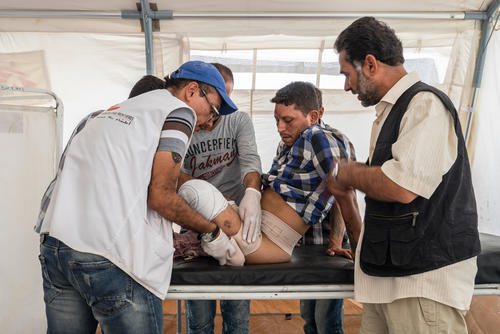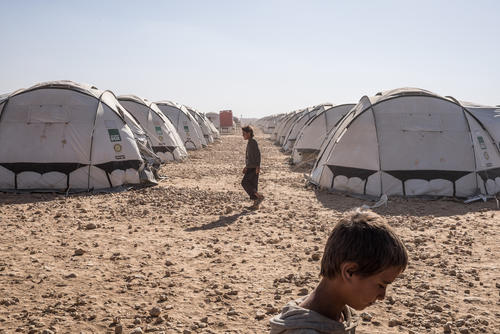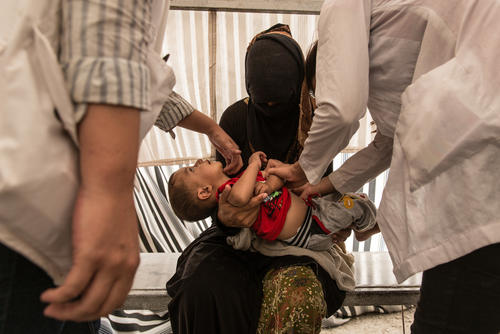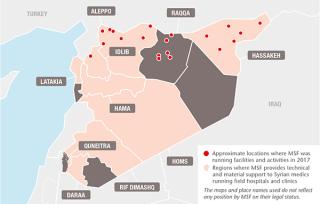
647,600
647,6
30,100
30,1
10,000
10,

11,400
11,4
3,500
3,5
23,000
23,
Civilians, civilian areas and civilian infrastructure continued to come under direct fire in 2017. Thousands of people were killed and wounded in military offensives around the country and hundreds of thousands more were forced from their homes by the conflict. Meanwhile, 11 medical facilities supported by MSF were hit by bombs or shells on 12 occasions in targeted or indiscriminate attacks.
MSF continues to provide medical and humanitarian assistance in Syria but its activities are severely limited by insecurity and constraints on access.
MSF always negotiates access with the authorities – official or de facto – in control of an area. However, the Islamic State group has not given any assurances since it abducted MSF staff in 2014 and the Syrian government has not granted authorisation to work despite repeated requests.
In areas where access could be negotiated, MSF ran or directly supported six hospitals and seven health centres in 2017, and also deployed six mobile clinic teams and six vaccination teams in opposition-held regions across northern Syria.
In areas where staff could not be deployed or permanently present, MSF maintained its distance support of medical facilities. Mostly run from neighbouring countries, this consisted of: donations of medicines, medical material and relief items; remote training of medics inside Syria; technical medical advice; and financial support to cover the facilities’ running costs. In besieged areas, MSF’s underground support was all the more critical as medical essentials were often removed from official aid convoys by the besieging forces.
In 2017, facilities receiving distance support from MSF conducted more than 2.6 million outpatient consultations and 158,000 major and minor surgical procedures, assisted over 38,000 births and admitted more than 152,000 patients for hospital care. While some of these facilities are fully reliant on MSF for support, others are supported by a range of organisations so the above figures cannot be entirely attributed to MSF programmes.
Raqqa governorate
In June, the Syrian Democratic Forces (SDF) launched an offensive with US-led international support to take control of Raqqa city. As the frontlines approached the city, civilians became trapped and high levels of insecurity made it extremely difficult to reach those in need. MSF set up a medical stabilisation unit near the frontlines to improve the survival chances of people injured in the fighting or as they fled the city.
In November, after the active fighting subsided in Raqqa, MSF was one of the only organisations to start providing medical assistance inside the city, through a primary healthcare unit and a stabilisation point. As residents started to return, many were wounded or killed by booby traps, improvised explosive devices, mines and explosive ordnance that littered the city. MSF treated 233 people for these types of injury in the last six weeks of 2017.
The hospital in Tal Abyad was partially damaged in an SDF-led offensive to take control of the town. MSF had started working there in partnership with the local health authorities in anticipation of an influx of war-wounded from Raqqa city and neighbouring areas. MSF supported all the hospital’s main departments, including its paediatric, maternity, surgical, vaccination, Thalassemia and mental health work. During the Raqqa offensive the team admitted hundreds of patients for major surgery; 73 per cent of the procedures were considered lifesaving and more than half were conflict related, mainly blast injuries.
Ain Issa displacement camp, to the north of Raqqa, became an official transit camp for displaced people. As arrivals to the camp increased, teams distributed relief items such as mattresses, blankets and hygiene kits, set up water and sanitation services, and responded to a measles outbreak, as well as conducting routine vaccinations. They also built a medical and mental health clinic and supported a volunteer-run primary healthcare centre.
In July, MSF rehabilitated a primary healthcare centre in Tabqa and started offering medical consultations, mental healthcare and physiotherapy to displaced people. To the north of Tabqa, a team in Twaheenah displacement camp conducted measles vaccinations and provided primary healthcare.
MSF supported or administered more than 100,000 vaccinations to children across Raqqa governorate in 2017, many of whom were living in previously inaccessible areas.

Hassakeh governorate
Intense fighting in northeast Syria resulted in massive displacement, thousands of casualties and severe damage to health facilities. Many injured patients were treated in the emergency room that MSF rehabilitated in the main referral hospital in Hassakeh.
As in Raqqa, when the violence subsided and people began to return home, the team saw a sharp increase in the number of patients wounded by explosive devices that had been left or placed in homes, on agricultural land and along roadsides.
In 2017, MSF treated nearly 3,800 patients in the emergency room and performed 563 surgical procedures.
MSF also managed two primary healthcare centres in Hassakeh and ran mobile and fixed clinics in camps for displaced people, focusing on mental and reproductive healthcare and treatment for non-communicable diseases (NCDs) such as hypertension and diabetes.
Aleppo governorate
In Azaz district, MSF maintained its full support of Al Salamah hospital, where both primary and secondary healthcare is available. As no regular vaccinations had been administered in this area since 2014, MSF launched a large-scale vaccination campaign.
In March, in response to a large influx of people displaced by fighting in northern Syria, MSF started working at Manbij hospital, in partnership with the local health authorities. Teams ran mobile clinics in the surrounding area and in camps, and conducted vaccinations throughout the district.
In Kobanê/Ain Al Arab, MSF is working with the local health authorities to re-establish basic health facilities, providing outpatient consultations, vaccinations and psychological support. In 2017, the team built an outpatient department and supported the emergency room, intensive care unit, maternity ward, operating theatre and nursing activities at Kobanê general hospital with supervision, training and drug supplies.

Idlib governorate
Throughout 2017, MSF supported vaccination programmes in northern Idlib and deployed mobile teams to assist people arriving at camps and settlements. As well as offering medical consultations, teams distributed winter survival and hygiene kits, and conducted water and sanitation activities.
In November, MSF started to focus on direct medical assistance for people with NCDs, supporting teams in Taqad and Tal Krysian primary healthcare centres and running mobile clinics in remote villages.
MSF reinforced its distance support for post-kidney transplant patients across the governorate, ensuring continued access to lifesaving care for more than 90 people.
In Qunaya, MSF signed a co-management agreement with the regional referral hospital and deployed five permanent staff to provide material and technical oversight across all services.
MSF continued to offer specialist care for burns patients at Atmeh hospital, including surgery, skin grafts, dressings, physiotherapy and psychological support.
Homs governorate
In the besieged, opposition-controlled area of northern Homs, MSF continued its distance support of eight medical facilities. Distance support for post-kidney transplant patients was also conducted in northern Homs, where 26 patients were enrolled.
Rif Dimashq governorate
Periods of heightened siege and bombardment by the Syrian government coalition, which preceded so-called ‘reconciliation’ agreements, effectively cut off MSF’s avenues of support to communities in heavily shelled areas of Rif Dimashq, central Syria, where medical needs remained immense.
In May, MSF suspended all its medical support in East Ghouta for around a month in response to non-respect of healthcare during a period of intense fighting between armed opposition groups in the area.
Over the year, MSF reduced its distance-support programme in Rif Dimashq from 33 to 22 facilities, in order to focus on the most medically relevant hospitals and clinics, with non-trauma medical needs as high a priority as treating war wounds.
Daraa and Quneitra governorates
MSF provided medical, technical and logistical support to eight health facilities in southern Syria to improve access to care for displaced people and local communities in Daraa and Quneitra. MSF also worked on a remote ‘telemedicine’ support service, to be implemented in early 2018.


















